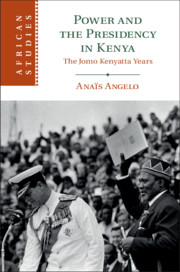Refine search
Actions for selected content:
11 results
“Blackshirts” and “Blacklists”: The Politics of Late-Colonial Central Kenya, 1958–1963
-
- Journal:
- Itinerario , First View
- Published online by Cambridge University Press:
- 27 October 2025, pp. 1-16
-
- Article
-
- You have access
- Open access
- HTML
- Export citation
1 - Protecting Bad Intel in a Dirty War
- from Part I - Struggle to Conceal
-
- Book:
- Curating the Colonial Past
- Published online:
- 12 September 2025
- Print publication:
- 02 October 2025, pp 35-57
-
- Chapter
- Export citation
1 - Regional Learning
-
- Book:
- African Activists in a Decolonising World
- Published online:
- 02 March 2023
- Print publication:
- 09 March 2023, pp 22-58
-
- Chapter
- Export citation
5 - Homes Away from Home: The Houses of Windsor
- from Part II - Registers
-
- Book:
- Untied Kingdom
- Published online:
- 16 February 2023
- Print publication:
- 16 February 2023, pp 129-158
-
- Chapter
- Export citation
“On Reading Mau Mau”
-
- Journal:
- Cambridge Journal of Postcolonial Literary Inquiry / Volume 10 / Issue 1 / January 2023
- Published online by Cambridge University Press:
- 16 December 2022, pp. 37-56
-
- Article
-
- You have access
- Open access
- HTML
- Export citation
“Mau Mau are Angels … Sent by Haile Selassie”: A Kenyan War in Jamaica
-
- Journal:
- Comparative Studies in Society and History / Volume 62 / Issue 4 / October 2020
- Published online by Cambridge University Press:
- 29 September 2020, pp. 714-744
-
- Article
- Export citation
3 - Historical Origins of Electoral Violence
-
- Book:
- Political Violence in Kenya
- Published online:
- 14 May 2020
- Print publication:
- 28 May 2020, pp 70-104
-
- Chapter
- Export citation
2 - Africa, Decolonisation and Human Rightsin the 1950s
-
- Book:
- Amnesty International and Human Rights Activism in Postwar Britain, 1945–1977
- Published online:
- 10 April 2020
- Print publication:
- 30 April 2020, pp 55-80
-
- Chapter
- Export citation
2 - From Prison to Party Leader, an Ambiguous Ascension (1958–1961)
-
- Book:
- Power and the Presidency in Kenya
- Published online:
- 11 October 2019
- Print publication:
- 31 October 2019, pp 66-94
-
- Chapter
- Export citation

Power and the Presidency in Kenya
- The Jomo Kenyatta Years
-
- Published online:
- 11 October 2019
- Print publication:
- 31 October 2019
THE ENEMY WITHIN: LOYALISTS AND THE WAR AGAINST MAU MAU IN KENYA*
-
- Journal:
- The Journal of African History / Volume 48 / Issue 2 / July 2007
- Published online by Cambridge University Press:
- 05 September 2007, pp. 291-315
-
- Article
-
- You have access
- HTML
- Export citation
